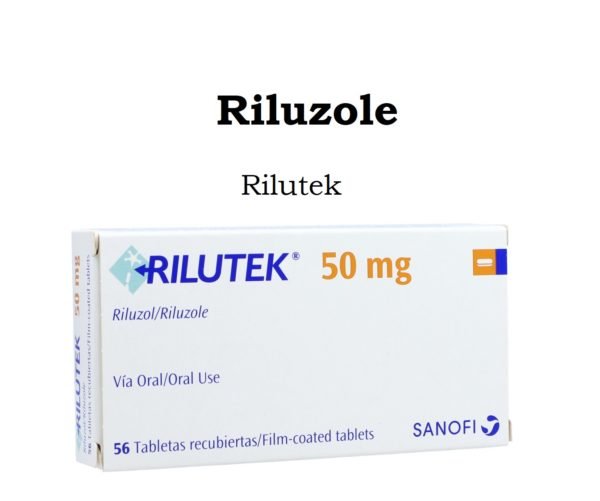Riluzole is available by the brand name of Rilutek (marketed by Sanofi Aventis), among others. The exact mechanism of the drug is not known.
Riluzole (Rilutek - Sanofi) Uses:
-
Amyotrophic lateral sclerosis:
- It is used in the treatment of patients with amyotrophic lateral sclerosis (ALS).
- Riluzole may extend survival and/or the time to tracheostomy
Riluzole (Rilutek) Dose in Adults
Riluzole (Rilutek) Dose in the treatment of Amyotrophic lateral sclerosis (ALS):
- 50 mg orally two times a day.
Riluzole (Rilutek) Dose in Children
Not applicable
Pregnancy Risk Category: D
- Negative events were observed in animal reproduction studies.
Use of iluzole while breastfeeding
- It is unknown if the drug will be excreted into breastmilk.
- Breastfeeding women should not be exposed to the drug.
Riluzole dose in Renal disease:
The manufacturer has not recommended any adjustments in the dose in patients with renal disease.
Riluzole dose in liver disease:
- Although the manufacturer has not made any adjustments to the dosage, you should still use it with caution.
- Patients with higher than five times the normal hepatic enzyme levels at baseline should avoid it.
- If hepatic dysfunction develops during treatment, the treatment must be stopped immediately.
Common Side Effects of Riluzole (Rilutek):
-
Gastrointestinal:
- Nausea
-
Neuromuscular & skeletal:
- Weakness
Less Common Side Effects of Riluzole:
-
Cardiovascular:
- Hypertension
- Peripheral Edema
- Tachycardia
-
Central Nervous System:
- Dizziness
- Drowsiness
- Vertigo
- Malaise
-
Dermatologic:
- Pruritus
- Eczema
- Exfoliative Dermatitis
-
Gastrointestinal:
- Abdominal Pain
- Vomiting
- Flatulence
- Oral Paresthesia
- Dental Caries
- Oral Candidiasis
- Stomatitis
-
Genitourinary:
- Urinary Tract Infection
- Dysuria
-
Hepatic:
- Increased Liver Enzymes
-
Neuromuscular & Skeletal:
- Arthralgia
- Tremor
-
Respiratory:
- Decreased Lung Function
- Cough
Contraindications to Riluzole (Rilutek):
- Allergy reactions to riluzole and any component of this formulation
- Liver disease and serum transaminases more than 3x the ULN at baseline
- Pregnancy
- Breastfeeding
Warnings and precautions
-
Depression in the CNS:
- It can cause CNS depression, manifested as somnolence or drowsiness.
- The drug should not be used on patients who are using heavy machinery or have mental alertness.
-
Hepatic effects
- Hepatotoxicity can occur and may prove fatal.
- During the initial three months of therapy, liver enzymes can be deranged.
- Patients with liver enzymes greater than 5x the normal upper limit must stop taking the medication.
- For the first three months, it is important to monitor liver enzymes monthly and then every other month thereafter.
- If hepatic dysfunction develops, the treatment must be stopped immediately.
-
Neutropenia
- During the first two months of therapy, there may be severe neutropenia (less than 500/mm3).
- If a patient has a fever or any other symptoms of infection, he/she should be evaluated and monitored regularly.
-
Pulmonary disorders
- ILD (interstitial pulmonary disease) and HSP (hypersensitivity pneumonia) have been reported.
- If ILD is suspected, treatment should be stopped immediately.
-
Hepatic impairment
- Patients with liver disease should be cautious.
Riluzole: Drug Interaction
|
CYP1A2 Inducers (Moderate) |
May decrease the serum concentration of Riluzole. |
|
Tobacco (Smoked) |
May decrease the serum concentration of Riluzole. |
Monitor:
- Liver enzymes before and during the treatment.
- Clinical features of liver injury for the first three months and periodically thereafter.
How to administer Riluzole (Rilutek)?
- Orally, it is best to administer it.
- It should be taken orally at the same time as a meal, either one hour before or after it.
- Before the suspension is administered, it should be shaken vigorously for at least 30 seconds.
Mechanism of action of Riluzole (Rilutek):
- It is unknown what the drug does.
- It inhibits excitatory neurotransmitters like glutamate and inactivates voltage-gated sodium channels.
- Interference with intracellular events that occur after the binding of excitatory neurons is also possible.
Absorption:
- Suspension High-fat meals reduce absorption (AUC drops by 9%, peak blood levels by 55%).
- Tablets High-fat meals reduce the absorption of tablets (the AUC is decreased by 20% and peak blood levels are reduced by 45%).
Plasma protein binding96% of the protein is bound to proteins, most notably to albumin and lipoproteins. Time to get there
Peak serum concentration It takes 0.8 hours to suspend.
MetabolismCYP1A2 & UGT-HP4 are the methods by which it is metabolized in the liver
Bioavailability After oral administration: Absolute: 60%
Eliminating half-life: 12 hours
Excretion: Urine (90%, 2% as an unchanged drug) and feces (5%).
International Brands of Riluzole:
- Rilutek
- Tiglutik
- APO-Riluzole
- MYLAN-Riluzole;
- Borizol
- Laidec
- Rilutan
- Rilutek
- Sclefic
- Teglutik
- Xie Yi Li
Riluzole Brand Names in Pakistan:
No Brands Available in Pakistan.







